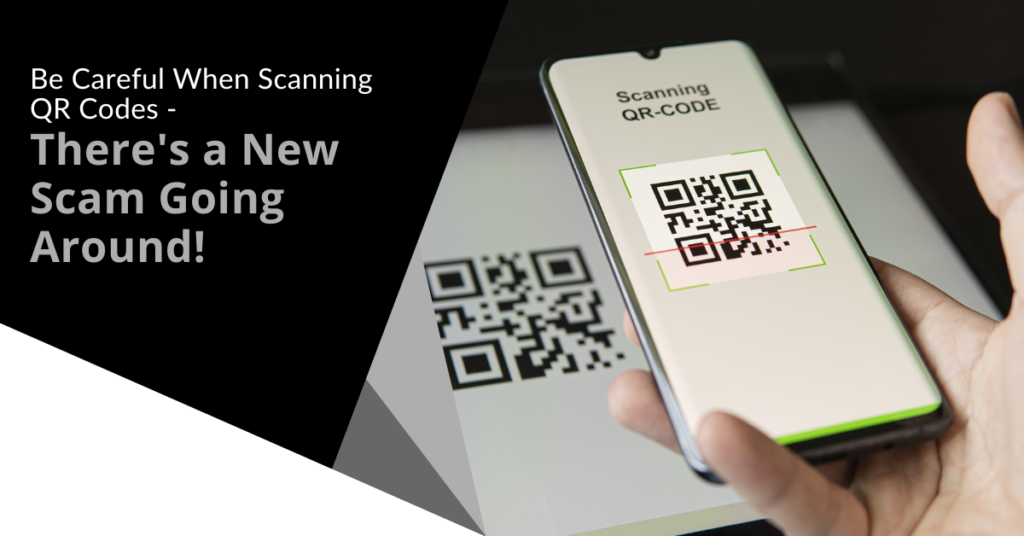|
Getting your Trinity Audio player ready...
|

QR codes are becoming increasingly common, found everywhere from restaurant menus to posters and flyers. They’re popular both online and offline, providing a simple way to access links, coupons, videos, or other online content by just scanning them with your smartphone camera. Their convenience, however, has drawn the attention of cybercriminals who are exploiting this technology for malicious purposes. These scammers create fake QR codes to steal personal information, infect devices with malware, or trick people into making payments.
It’s more important than ever to be cautious when scanning QR codes. This emerging threat serves as a reminder of the potential dangers that can be hidden behind these seemingly harmless squares.
The Rise of QR Codes
Originally developed for tracking parts in the automotive industry, QR codes have made a significant comeback in recent years, particularly as a marketing tool. They provide quick and easy access to information and have become essential in industries like retail and hospitality. Unfortunately, cybercriminals are quick to exploit the trust placed in QR codes, leading to a new wave of phishing scams.
Understanding the Scam
Scammers often create counterfeit QR codes and place them over legitimate ones. For instance, they might stick a fake code on a poster advertising a discount or movie. When you scan the code, thinking it’s legitimate, it could lead you to a phishing site asking for sensitive information like credit card numbers or login credentials. In other cases, scanning the code might prompt a download of malware that can spy on your activities, access your clipboard history and contacts, or even lock your device until a ransom is paid. The fake code could also lead to a payment page that charges you for something that should be free.
Common Tactics Used by Scammers
- Hidden Malicious Codes: Cybercriminals may tamper with real QR codes by placing a fake one over them, embedding harmful content, or redirecting users to fraudulent websites.
- Fake Promotions and Contests: Scammers use QR codes to draw people into fake contests or promotions, which can lead to identity theft or financial fraud when users are asked to provide personal details.
- Malware Distribution: Scanning a malicious QR code might initiate the download of malware onto your device, compromising your security and potentially causing significant damage.
How to Safeguard Yourself While Scanning QR Codes
- Verify the Source: Always be cautious when scanning QR codes from unfamiliar or untrusted sources. Confirm the legitimacy of the code and its origin, especially if prompted to enter personal information.
- Use a Dedicated Scanner App: Instead of using your device’s default camera app, consider a dedicated QR code scanner app that offers extra security features, such as code analysis and website reputation checks.
- Inspect the URL Before Clicking: Before clicking on a link from a scanned QR code, check the URL to ensure it matches the official website of the organization it claims to represent.
- Avoid Scanning Suspicious Codes: Trust your instincts—if a code looks tampered with, damaged, or suspicious, don’t scan it. Be especially cautious in public places, as scammers often prey on curiosity.
- Keep Your Device and Apps Updated: Regularly update your device’s operating system to protect against vulnerabilities. Updates often include important security patches.
- Be Cautious About Websites Accessed via QR Code: Avoid entering personal information on websites accessed through a QR code. Don’t make payments or donations unless you’re certain they’re secure and trustworthy.
Reach Out for Phishing-Resistant Security Solutions
While QR codes can be convenient and fun, they also pose risks if used carelessly. Always exercise caution when scanning them to protect yourself from scammers who might exploit your curiosity. This type of scam is a form of phishing, one of the most dangerous threats in the digital world today. If you need help making sure your devices are resistant to phishing attacks, don’t hesitate to contact us. We’re here to help you stay safe.
Twintel has grown into an expansive, full team of IT services professionals, acting as the outsourced IT department of non-profits, small to mid-size businesses, and enterprise-level corporations in Orange County, across California, and nationally.
Today, it’s the strength and deep expertise of the Twintel team that drives positive outcomes for clients. Each of the support staff, technicians, and engineers works diligently each day to make sure that the companies served have the seamless, secure, and stable IT environments needed to allow them to pursue their organizational objectives.